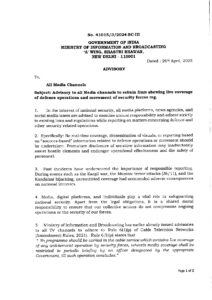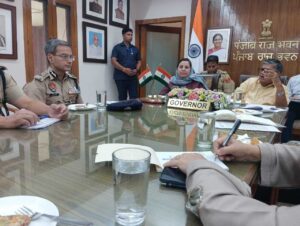Rajkot’s Navratri celebration: Women perform ‘Garba’ on two-wheelers with swords in hand
Rajkot (Gujarat) [India], October 18 (ANI): On the third day of the Navratri festival in Gujarat’s Rajkot on Tuesday, women displayed remarkable enthusiasm as they performed ‘Garba’ while wielding swords on two-wheelers at Rajvi palace.
The ‘Talwar Ras’ or ‘Sword-wielding’ is a traditional culture in Gujarat.
Women in traditional ‘Rajputana’ attires performed ‘Talwar Ras’ to honour Goddess Durga, at Rajvi Palace in Rajkot.
At the occasion, former Gujarat Chief Minister Vijay Rupani was also present.
The third day of the Navratri is dedicated to Goddess Chandraghanta who is the married form of Goddess Mahagauri.
Her name Chandra-Ghanta, means “one who has a half-moon shaped like a bell”.
Meanwhile, morning ‘aarti’ was performed at temples across the country on the third day of Navratri.
Early morning ‘aarti’ was performed at Delhi’s Chhatarpur Temple as well.
The temple ‘pujaris’ recited the prayers to Goddess Durga while a large number of devotees gathered to offer prayers and take part in the morning aarti.
Maharashtra’s Mumba Devi Temple in Mumbai also held ‘aarti’ to commence the third day of the nine-day Hindu festival of Navratri.
The temple echoed with the sounds of the temple bell and other instruments during the aarti.
Morning aarti was also held in Gujarat’s Umiya Temple in Surat.
Devotees in Kerala celebrated ‘Bommai Kolu’ at Sree Dharma Sastha Temple in Thrissur.
The 9-day-long festival of Shardiya Navratri is intended for worshipping Maa Durga and her nine avatars, known as Navdurga. Navratri means ‘nine nights’ in Sanskrit. Hindus observe a total of four Navratris throughout the year.
From Ashwin Shukla Paksha’s Navami until the Pratipada, Shardiya Navratri is observed. While it is celebrated with great fanfare across the nation, distinct traditions are more commonly practised in different states.
In India, Navratri is celebrated in a wide range of ways. Ramlila, a celebration in which scenes from the Ramayana are performed, is organised in various parts of the country. The burning of King Ravana’s effigies marks the story’s conclusion on Vijayadashami.
In Uttar Pradesh’s Mainpuri, Lord Ram’s ‘Barat’ was organised ahead of Vijayadashmi.
The ‘Barat’ procession was organised by the Ram Leela committee.
It passed through many areas of the district.






